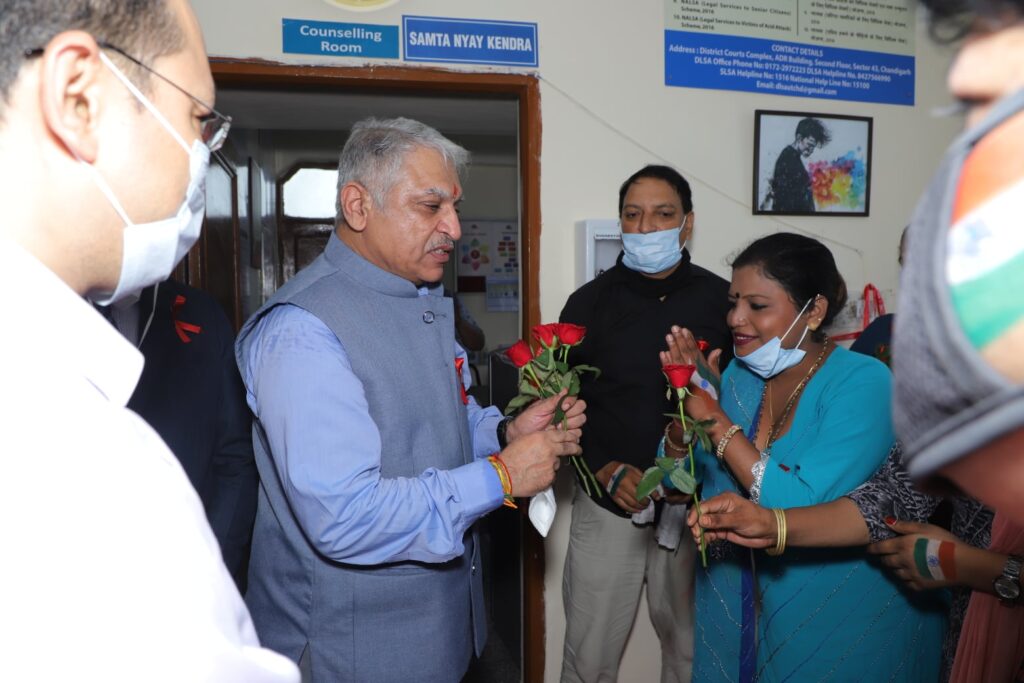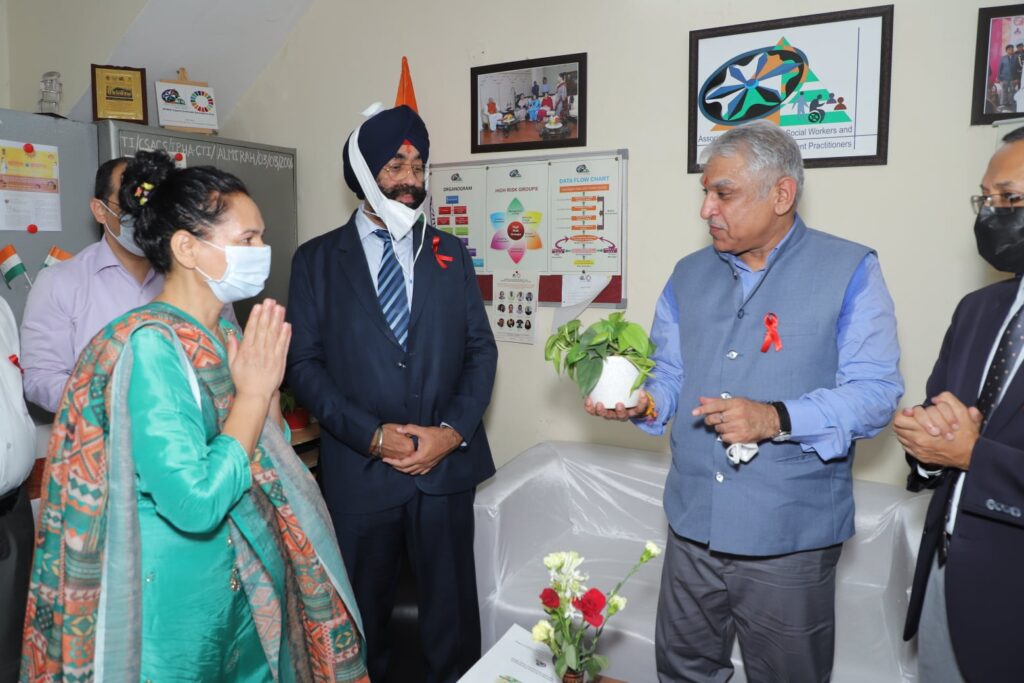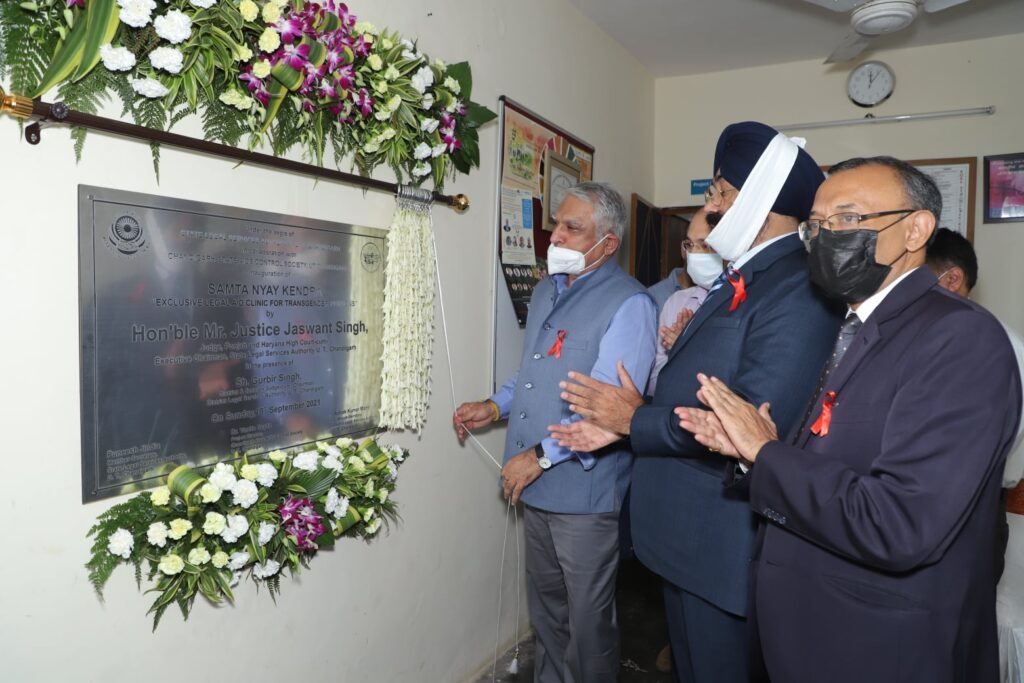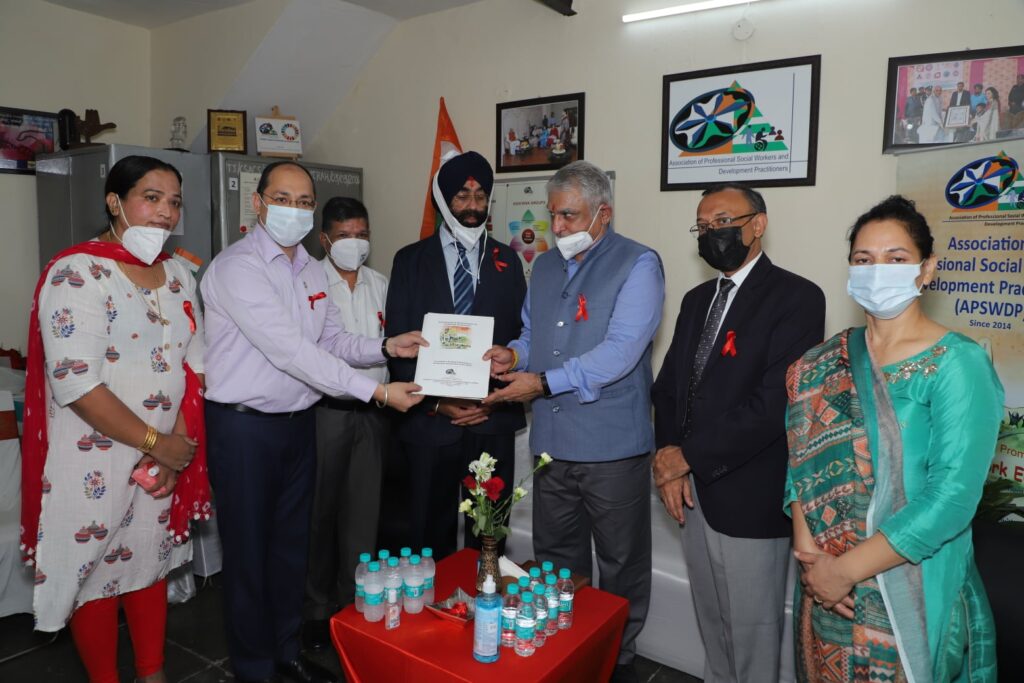SAMTA NYAY KENDRA (a Center for Mainstreaming and Empowerment of Transgenders and HRGs)




The Samta Nyay Kendra initiative, implemented by the Association of Professional Social Workers and Development Practitioners (APSWDP), is a pioneering effort aimed at providing free legal aid services, extended social, and counseling support, and network exclusively to the transgender community in Chandigarh. It was established in collaboration and mentorship support from the District Legal Services Authority (DLSA), State Legal Service Authority (SLSA) Chandigarh, and the Chandigarh State AIDS Control Society, Chandigarh.
The initiative seeks to address the legal needs and grievances faced by transgender persons, who often encounter discrimination, marginalization and struggle personal to live a decent life with livelihood.
At its core, the vision of the Samta Nyay Kendra is to ensure equitable access to justice and rights for transgender persons. Its role extends beyond legal aid; the Kendra also provides comprehensive support services, including counseling, psychosocial support, and assistance with accessing social security schemes. By empowering transgender individuals to assert their rights and access redressal for their grievances, the initiative aims to foster inclusivity within society and raise awareness about transgender rights.
The participatory agencies, including the DLSA and the Chandigarh State AIDS Control Society, collaborate closely with APSWDP to provide financial, logistical, and operational support for the Kendra’s activities. Together, these stakeholders work towards creating an enabling environment where transgender individuals can seek legal assistance and support without fear of discrimination or bias.
Currently, the Samta Nyay Kendra is fully operational at its designated location in Chandigarh, offering a range of services tailored to the needs of the transgender community. These services include counseling, referral and linkages to essential services, formation of self-help groups, enrollment in social security schemes, and provision of free legal aid through DLSA panel lawyers. Through its efforts, the initiative aims to create a more equitable and inclusive society where all individuals, regardless of gender identity, can access justice and exercise their rights freely.
In summary, the Samta Nyay Kendra initiative represents a significant step towards addressing the legal needs of the transgender community in North India. Through its holistic approach and collaborative efforts, it serves as a beacon of hope for marginalized individuals seeking justice and empowerment.
Background: The Samta Nyay Kendra initiative, spearheaded by the Association of Professional Social Workers and Development Practitioners (APSWDP), was established in Chandigarh to address the legal needs of the transgender community. In collaboration with the District Legal Services Authority (DLSA) and the Chandigarh State AIDS Control Society, this initiative seeks to provide free legal aid services exclusively to transgender individuals who often face discrimination and marginalization in society.
Establishment of Priorities: The primary focus of the Samta Nyay Kendra initiative is to prioritize the legal rights and grievances of the transgender community. Key priorities include providing counseling, psycho-social support, referral and linkages to essential services, formation of self-help groups, enrollment in social security schemes, and provision of free legal aid through DLSA panel lawyers. These priorities are established to empower transgender individuals to assert their rights and access redressal for their grievances in an inclusive and supportive environment. At present, APSWDP is catering to more than 300 transgender in the city in various aspects.
Mobilization of Resources: The initiative mobilizes resources through collaborative efforts between APSWDP, the DLSA, and the Chandigarh State AIDS Control Society. Financial, logistical, and operational resources are pooled together to support the implementation of Samta Nyay Kendra’s activities. Additionally, efforts are made to leverage government support, particularly from the Livelihood Mission, and community partnerships through TG DERAs particularly Mangalmukhi TG Dera to enhance the reach and impact of the initiative. Through effective resource mobilization, the initiative aims to ensure the sustainable delivery of services to the transgender community. Two (2) Self-Help Groups comprising of 20 TGs identified among registered HRGs under the project and got linked under DAY NULM for livelihood generation activities. Two SHGs are given Operation and Management Contracts for running Public Toilet and Cleanliness activities in Chandigarh. In addition, few TGs have been empowered to take credit under the PM SVANidhi scheme from Banks for their small social enterprises and also were linked to skill training.
- Process and Results Achieved: The implementation process of Samta Nyay Kendra involves various stages, including needs assessment, service planning, outreach, service delivery, and monitoring and evaluation. Since its inception, the initiative has achieved significant results in providing essential legal aid services to the transgender community. These include the successful establishment and operationalization of the Kendra, provision of counseling and support services, enrollment of transgender individuals in social security schemes, and provision of free legal aid through dedicated panel lawyers. Moreover, the initiative has contributed to raising awareness about transgender rights and promoting inclusivity within society. Through its efforts, the initiative has empowered transgender individuals to access justice, assert their rights, and lead dignified lives free from discrimination and get their Identity Cards from the ministry portal for the first time. APSWDP is regularly working on their IDs processing which is a cumbersome work with procedures, to date processed more than 60 IDs.
- SUSTAINABILITY:
- Financial Sustainability: The project’s financial sustainability is ensured through various means, including collaboration under government agencies for resource allocation, seeking grants from CSR and philanthropist organizations, and exploring opportunities for individual micro sponsorship and individual donations from APSWDP members too. Additionally, the project aims to establish and get Transgender linked to income-generating activities through SHGs through Kendra to supplement and ensure long-term sustenance.
- Social and Economic Sustainability: Samta Nyay Kendra promotes social and economic sustainability by empowering transgender individuals through legal aid, counseling, and support services. By facilitating access to justice and advocating for transgender rights, the project contributes to social inclusion and economic empowerment. Furthermore, by assisting in the enrollment of transgender individuals in social security schemes and providing linkages to livelihood opportunities, the project enhances economic resilience within the transgender community.
- Cultural Sustainability: The project fosters cultural sustainability by promoting awareness and understanding of transgender rights and issues within society. Through legal awareness campaigns, cultural sensitization workshops, and community outreach programs, the project aims to challenge cultural norms and stereotypes surrounding gender identity and expression, thereby fostering a more inclusive and accepting cultural environment. APSWDP has been organizing various events like Swachh Holi with the transgender community to make their culture intact alongside their mainstreaming.
- Environmental Sustainability: While the primary focus of the project is on social and legal empowerment, efforts are made to ensure environmental sustainability by adopting eco-friendly practices in Kendra operations. This may include minimizing paper usage, promoting energy efficiency, and implementing waste management strategies to reduce the project’s environmental footprint. Though TG SHGs are being roped in the cleanliness campaign in the city under SBM too.
- Institutional Sustainability: Institutional sustainability is maintained through the establishment of robust governance structures and partnerships with relevant stakeholders. By collaborating with government agencies, legal institutions, civil society organizations, and community leaders, the project builds institutional capacity and fosters a supportive ecosystem for sustainable service delivery. Additionally, the project invests in capacity-building and training initiatives to ensure the continued effectiveness and relevance of Kendra’s activities in the long run.
Transferability: The Samta Nyay Kendra project offers valuable insights and lessons that can be applied to similar initiatives addressing the legal needs of marginalized communities. Its transferability lies in the following aspects:
- Replicable Model: The project’s model of establishing legal aid clinics exclusively for the transgender community can be replicated in other regions and jurisdictions with similar legal frameworks and social contexts. By adapting the project’s approach to local needs and sensitivities, similar initiatives can effectively address the legal challenges faced by transgender individuals elsewhere.
- Collaborative Partnerships: The project’s success is attributed to its collaborative partnerships with government agencies, legal institutions, and civil society organizations. This collaborative approach can be replicated in other settings to leverage resources, expertise, and support for sustainable implementation. In the project, partnership was built with the Regional Institute of Cooperative Management (RICM) under Ministry of Cooperation, Govt. of India for capacity building and training of TGs on cooperatives and Self Help Groups.
- Capacity Building: The project’s emphasis on capacity building, including training for legal professionals, para-legal volunteers, and community members, is essential for ensuring the effective delivery of legal aid services. Similar initiatives can prioritize capacity building to enhance the skills and knowledge of stakeholders involved in legal empowerment efforts.
Lessons Learned:
1. Community Engagement: The project highlights the importance of community engagement and participation in legal empowerment initiatives. By involving transgender individuals in decision-making processes, outreach activities, and awareness campaigns, the project builds trust, ownership, and sustainability within the community.
2. Legal Awareness: A key lesson learned is the significance of legal awareness and education in empowering marginalized communities. By providing legal literacy programs and workshops, the project equips transgender individuals with the knowledge and tools to navigate the legal system and assert their rights effectively.
3. Holistic Approach: The project’s holistic approach, which combines legal aid with psychosocial support, counseling, and referral services, underscores the importance of addressing the multifaceted needs of marginalized populations. Similar initiatives can adopt a comprehensive approach that addresses the social, economic, and psychological dimensions of legal empowerment.
In summary, the Samta Nyay Kendra project offers valuable insights into the transferability of its model and the lessons learned in promoting sustainable legal empowerment for marginalized communities. By leveraging collaborative partnerships, prioritizing community engagement, and adopting a holistic approach, similar initiatives can effectively address the legal needs of marginalized populations and promote social justice and inclusion.
The Project is recognized as one of the National; Best Practices to Improve the Living Environment under the HUDCO Award 2024 given by the Minister of State Housing and Urban Affairs, in the presence of UN India Resident Head, Secretary, MOHUA, Chairman HUDCO on the occasion of World Habitat Day 2024 at vigyan Bhawan with 1100 USD Cash Prize.

